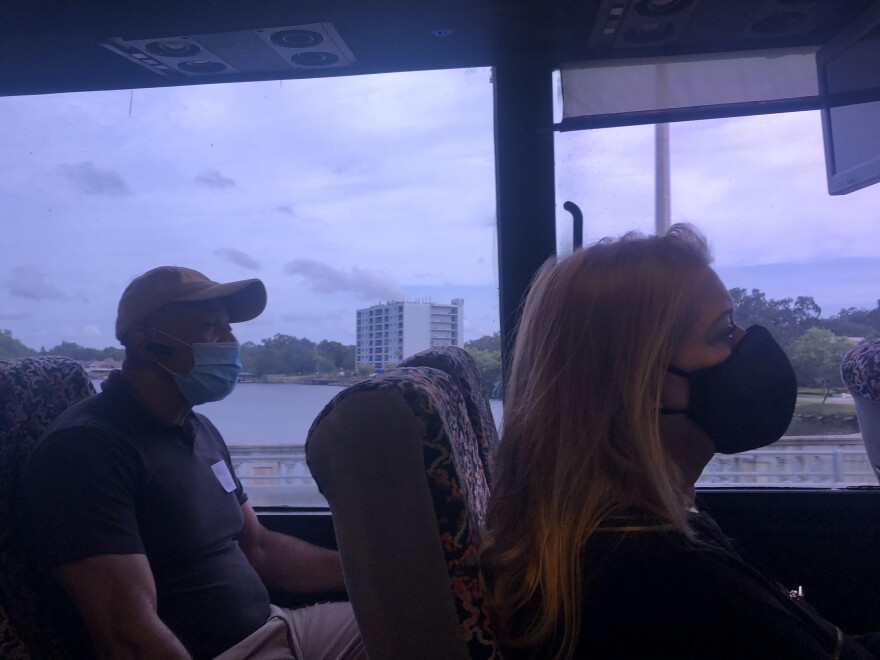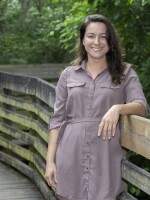On a bright Saturday morning outside Howard W. Blake High School in West Tampa, a white air-conditioned bus waited for about 25 people to climb aboard.
In the meantime, guests got startled by a fake text alert saying Hurricane Phoenix is approaching rapidly and they should evacuate immediately. This simulated Category 5 storm is Tampa Bay's worst-case scenario with projected storm surge up to 42 feet.
It was all part of the “Tampa Bay Toxic Bus Tour.” Environmental advocates in Tampa launched the tour this past weekend, driving community members around Hillsborough County to highlight potential disaster zones, underserved areas, and possible solutions.




Walter L. Smith II, with the Sierra Club and Tampa Bay Disaster Initiative, organized the event.
He began by talking about "energy burdens" — that's when low-income households sometimes use a greater portion of their paychecks on energy than some of their well-off neighbors. According to the U.S. Department of Energy, residents living near Blake High spend, on average, 11% of their gross household income on energy costs — three times more than the national average.
"What that means is you have to figure out if you want to put gas in your car or pay your electric bill," said Smith.
Tampa Electric serves a lot of the region, including Hillsborough and part of Polk, Pasco and Pinellas counties. Advocates take issue with some of the ways in which the utility operates.
And that was actually the first stop: TECO's Big Bend Station in Apollo Beach, which is a 30-minute drive from the high school. The facility is in a flood zone on the eastern edge of Tampa Bay.
“All right, so everybody understands, we are standing right here smack dab in the middle of the belly of the beast,” said Smith, as the group filed out of the bus and assembled onto the side of Big Bend Road.
There wasn’t much to see except for high grassy hills and power lines, but acres of coal ash ponds reside there. It's a byproduct of burning coal to produce electricity that’s put into the ground for storage and protected by 30-foot walls.
With 42 feet of storm surge projected in a worst-case scenario, Sierra Club's Gonzalo Valdes told the tourists that this is a toxic spill waiting to happen.
"As we know, the surrounding communities that are Category 2, Category 3 flood zones are gonna experience those impacts - areas like Progress Village, Riverview, Gibsonton," said Valdes.
Advocates want TECO to get rid of the ponds and switch to solar energy, but they do give credit to the utility for a "microgrid" pilot project, which was the second stop on the tour — another 30 minutes inland.
In Wimauma, TECO has included some new houses in an experimental Block Energy System, which uses solar power and battery storage to make them energy independent.
Surrounded by freshly built cookie-cutter homes, topped with solar panels, Valdes asked the group to close their eyes.
"I want you to imagine that category 5 storm has rolled through but you know you're not in a flood zone. You know that your electricity is going to be on. You know that you're prepared. You know that your neighbors are prepared. How do you feel?" he asked.
"Secure," said one person.
Advocates believe TECO should be providing this new technology to underserved communities, such as Progress Village, which is the tour's last stop. It was established in the 1960s for African Americans to purchase affordable suburban homes.
"When it's a light rain, the whole area will be flooded to where cars can't even go through … to where you will have to literally get buckets and things to get the water out of the homes,” said Chenelle Starling, who grew up in this neighborhood.
She said seeing those nice, new microgrid homes outside of a flood zone gave her hope.
"Now I know it can be done because I've seen it,” she said. “I’m just hoping that that is something that can be passed along with new developments and old developments, so everyone can have that."
A final text alert came through saying, "Due to the work of the Tampa Bay Disaster Resilience Initiative, we were able to avoid a toxic spill in South Hillsborough County."
Copyright 2021 WUSF Public Media - WUSF 89.7






